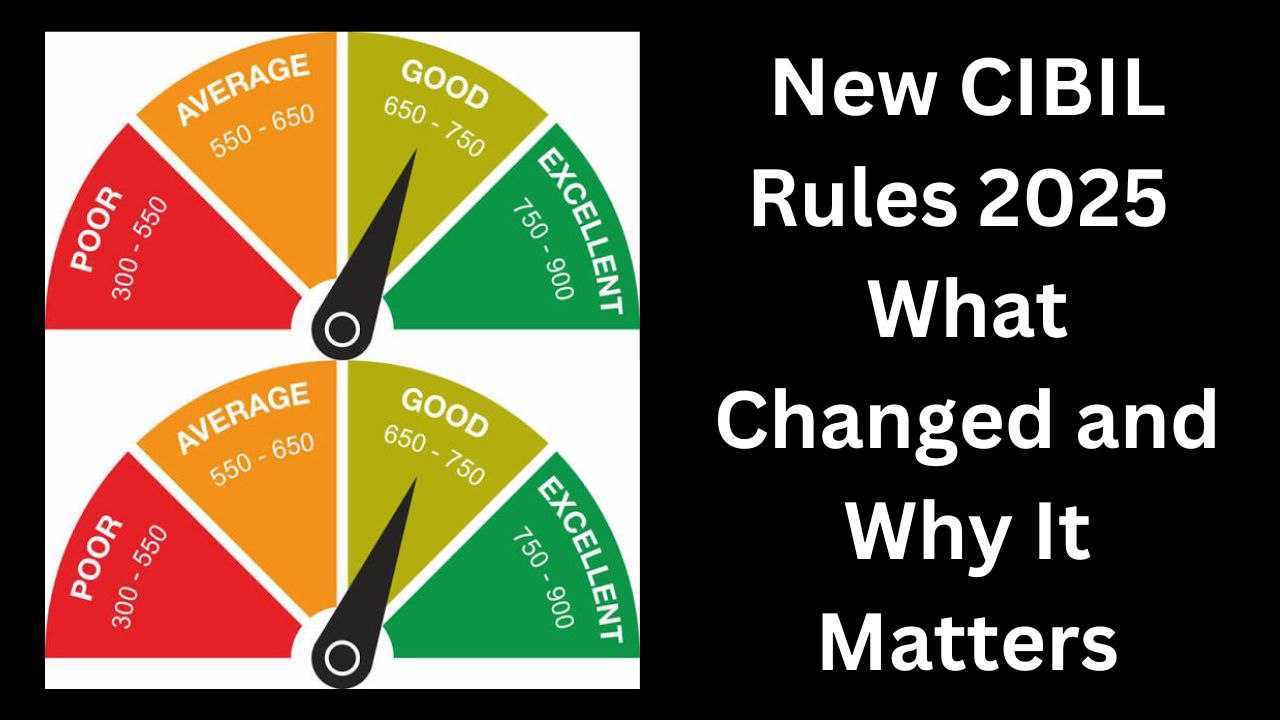Introduction: New CIBIL Rules 2025 What Changed and Why It Matters
New CIBIL Rules 2025 What Changed and Why It Matters: CIBIL, one of India’s most renowned credit information agencies, records customers’ credit history and assigns credit scores. This score is used by banks, NBFCs, and other lenders to decide whether to grant loans. In 2025, the RBI implemented some important reforms to make the process more transparent, fair, and consumer-friendly. In this article, we’ll discuss these new regulations, assess their impact, and explain how consumers and lenders should prepare.
Background: New CIBIL Rules 2025 What Changed and Why It Matters
Credit scores play a crucial role in the lending process. For most consumers, CIBIL scores range from 300 to 900, with a higher score indicating better credit behavior and a higher chance of obtaining a loan. However, it has been observed from time to time that report updates are delayed, incorrect information is retained, loan applications are rejected prematurely, and consumers are often left unsure about the reasons. To address these shortcomings, the RBI issued new guidelines in 2025.
What is CIBIL & Why It Matters: New CIBIL Rules 2025 What Changed and Why It Matters
Before diving into what’s new, let’s quickly recap what CIBIL is and why it’s important.
- CIBIL (Credit Information Bureau (India) Limited) is one of the major credit information companies (CICs) in India. It collects credit history from banks, NBFCs, and other lenders to create credit reports and scores for individuals.
- A good CIBIL score is crucial for getting loans or credit cards with favorable terms — lower interest rates, better approval chances, etc.
- Up until now, many lenders have heavily depended on one’s CIBIL score (or credit history) to decide whether to approve a loan.
who will be affected and how: New CIBIL Rules 2025 What Changed and Why It Matters
Benefits for Consumers:
- Potential for Faster Correction: If you’ve made a payment, it will be reported quickly, and your score will improve.
- Incorrect information can be corrected in a timely manner: Because report updates are quick and dispute resolution is faster, information about incorrect interest rates, old closed loans, etc. will be removed quickly.
- Transparency in Loan Applications: If an application is rejected, a clear reason will be provided, which will help identify areas to improve.
- Reliance from Sudden Defaults: Previously, if a bank immediately reported you as defaulting, your score could drop. Now, even minor defaults will have the opportunity to be corrected.
- Increased Consumer Control: It will be possible to view reports, file complaints, and make corrections in a timely manner.
Changes for Lenders / Banks / NBFCs:
- Operational Vigilance: Reporting must be timely, and the reasons for application rejections must be clearly stated.
- Quick Resolution of Customer Complaints: Financial penalties will be imposed if CICs or CIs fail to address disputes promptly. This will increase accountability in the system.
- Requirement for Data Quality and Accuracy: Misrepresentations or unexpected delays will impact lenders, as they will lead to a poor customer experience and potentially lead to legal/regulatory action.
- Developing a Process for Advance Notices: Ensure a process for sending notices before a default occurs, providing customers with an opportunity to respond.
Challenges and precautions:
- Complexity of Data Submission: Banks/NBFCs are required to update their information technology systems to ensure reporting is done every 15 days.
- Establish a timely notification/notice system: Ensure SMS/e-mail notifications are sent so that no customer information is lost or there are no delays in sending information.
- Lack of Consumer Awareness: Many people do not know what their reports are, how to view them, or how to file a complaint. Therefore, education and information dissemination are essential.
- Risk of Potential Delays: Although deadlines are established for reporting and dispute resolution, there may be resource or process constraints, especially in smaller financial institutions.
- Impact of Incorrect Information: If outdated or inaccurate information is submitted and not corrected in a timely manner, consumers may suffer.
Consumer Tips: What You Can Do
- Check your credit report regularly: Check the free report at least once a year. If you notice a loan showing as “active” even after it has been closed, or if the amount due is incorrect, file a complaint.
- Make EMI/loan payments on time: Don’t delay payments. If there is a delay due to any reason, try to correct it immediately.
- Control credit utilization: Don’t use a large portion of your credit card limit; full utilization can harm your score.
- Don’t apply for unnecessary loans: Frequently applying for too many loans/credit lines increases “cachin inquiries,” which can negatively impact your score.
- Immediately report incorrect information: If there are errors in name, address, account closure, etc., contact the bank/CIBIL immediately.
- Keep your notification settings updated: Keep your mobile number and email address updated so you can receive notifications via SMS/email.
Official External Links: New CIBIL Rules 2025 What Changed and Why It Matters
| New CIBIL Score | Click Here |
| Free CIBIL Score & Report page: | Click Here |
| RBI Notifications / Circulars | Click Here |
conclusion: New CIBIL Rules 2025 What Changed and Why It Matters
The new 2025 rules are genuine reforms implemented by CIBIL and the RBI to make credit reporting more transparent, consumer-friendly, and timely. They not only empower consumers to take control of their credit history but also enable lenders to better manage risk. If you are aware, develop good financial habits, and review your report periodically, these changes will prove positive for you.
